NRSG370 Clinical Integration Reflection 1: Health, Illness, and Dying
VerifiedAdded on 2022/10/01
|6
|1038
|122
Journal and Reflective Writing
AI Summary
This reflection paper, submitted by a nursing student, delves into the multifaceted perspectives of health, illness, dying, and death, particularly within the context of nursing practice. The assignment analyzes a journal article focusing on the experiences of registered nurses caring for terminally ill cancer patients in nursing homes, exploring the emotional turmoil, compassion fatigue, and burnout these professionals often face. The student integrates personal understanding with theoretical frameworks, such as compassion fatigue and job-related burnout, to examine the impact of workplace stress and emotional involvement on nurses. The paper highlights the importance of organizational support, emotional counseling, and strategies like self-care and recognition to mitigate the negative effects of caring for dying patients. The student concludes by emphasizing the need for comprehensive support systems to help nurses overcome the challenges associated with palliative care.
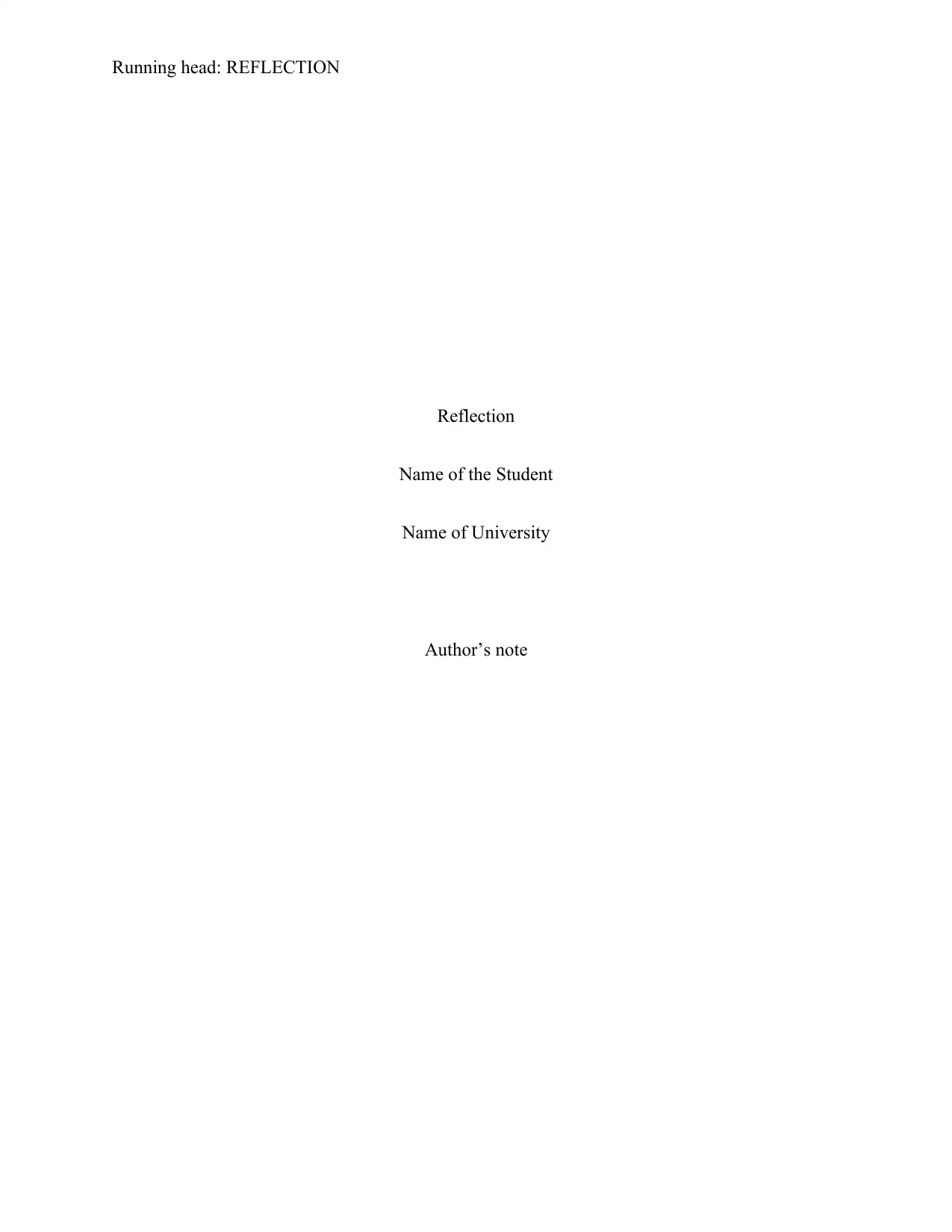
Running head: REFLECTION
Reflection
Name of the Student
Name of University
Author’s note
Reflection
Name of the Student
Name of University
Author’s note
Paraphrase This Document
Need a fresh take? Get an instant paraphrase of this document with our AI Paraphraser
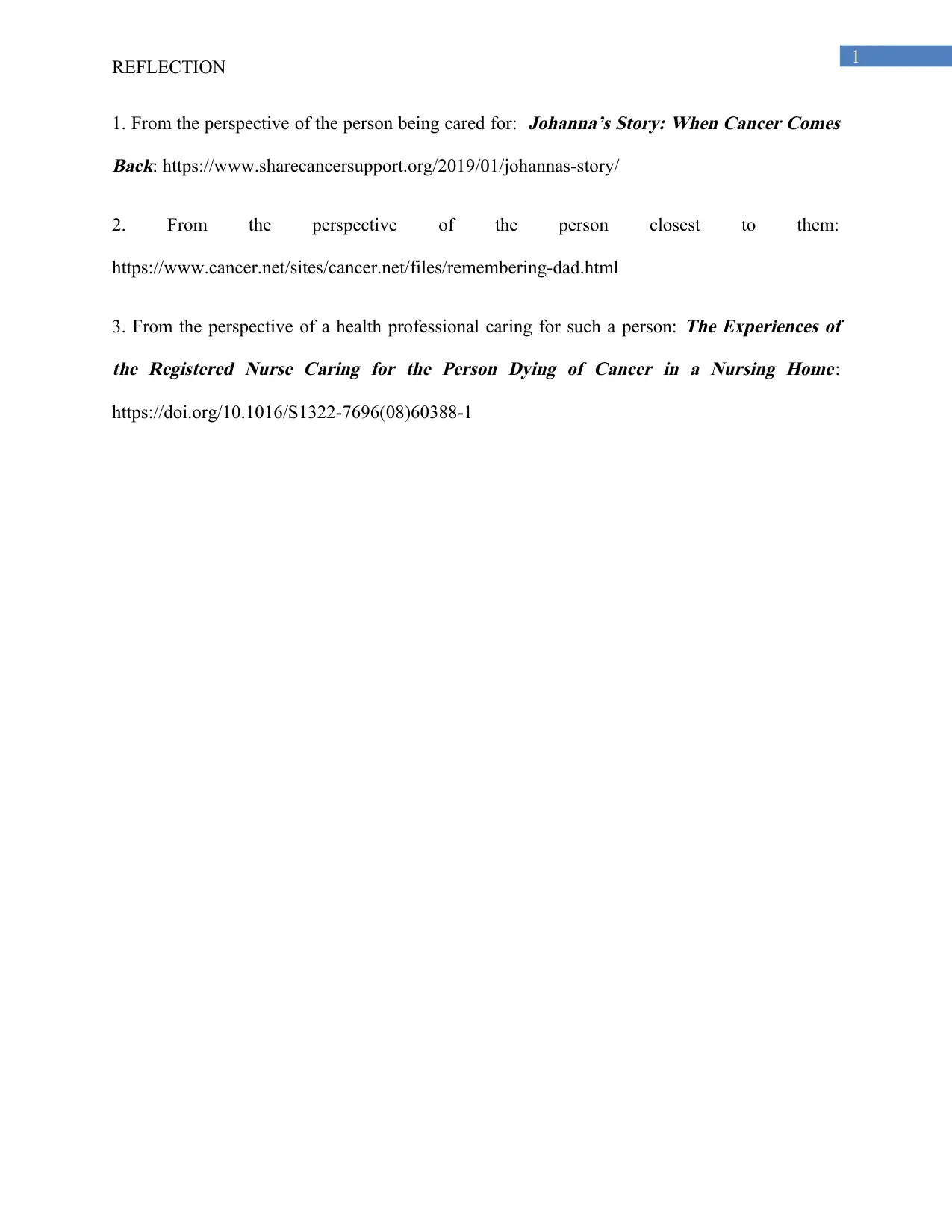
1
REFLECTION
1. From the perspective of the person being cared for:
Johanna’s Story: When Cancer Comes
Back: https://www.sharecancersupport.org/2019/01/johannas-story/
2. From the perspective of the person closest to them:
https://www.cancer.net/sites/cancer.net/files/remembering-dad.html
3. From the perspective of a health professional caring for such a person:
The Experiences of
the Registered Nurse Caring for the Person Dying of Cancer in a Nursing Home:
https://doi.org/10.1016/S1322-7696(08)60388-1
REFLECTION
1. From the perspective of the person being cared for:
Johanna’s Story: When Cancer Comes
Back: https://www.sharecancersupport.org/2019/01/johannas-story/
2. From the perspective of the person closest to them:
https://www.cancer.net/sites/cancer.net/files/remembering-dad.html
3. From the perspective of a health professional caring for such a person:
The Experiences of
the Registered Nurse Caring for the Person Dying of Cancer in a Nursing Home:
https://doi.org/10.1016/S1322-7696(08)60388-1
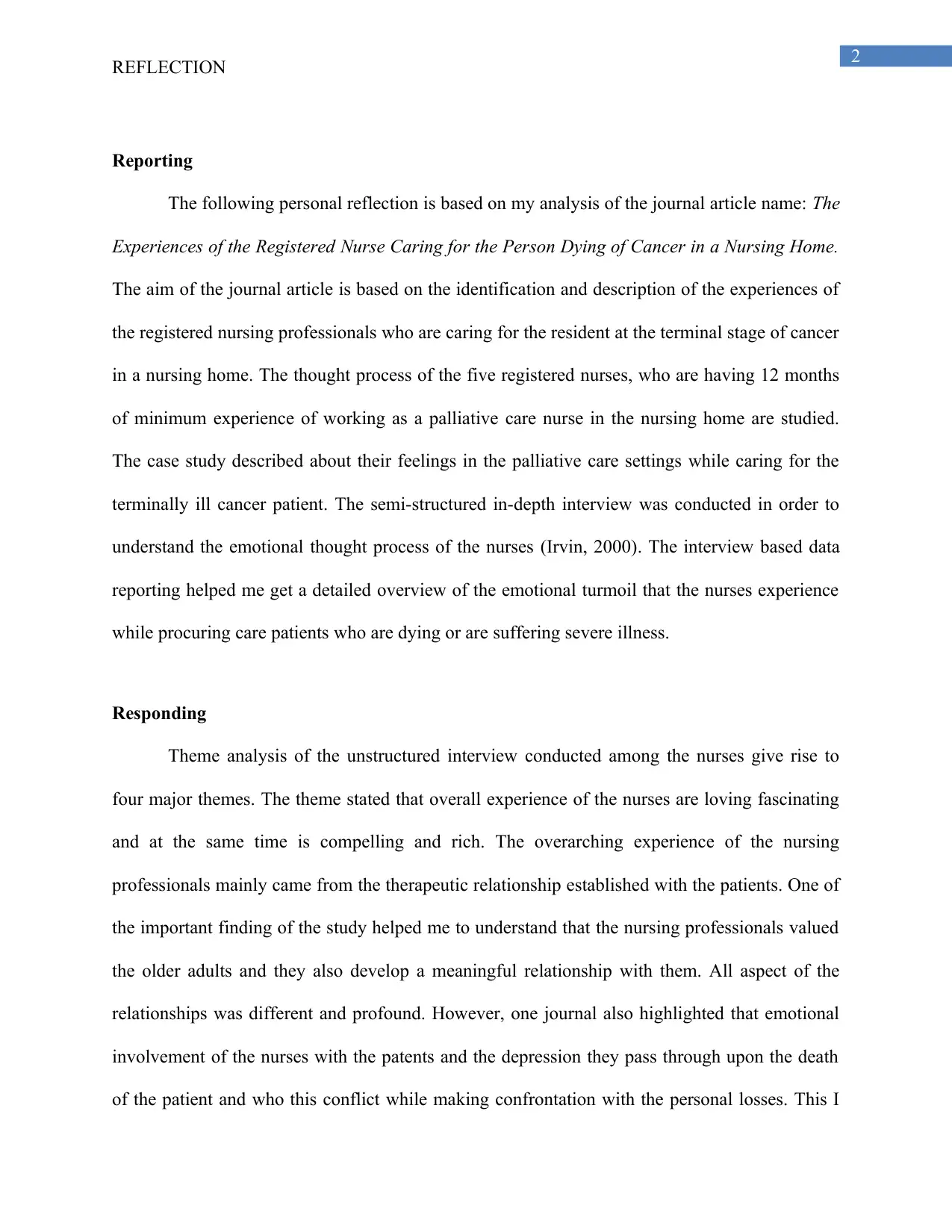
2
REFLECTION
Reporting
The following personal reflection is based on my analysis of the journal article name: The
Experiences of the Registered Nurse Caring for the Person Dying of Cancer in a Nursing Home.
The aim of the journal article is based on the identification and description of the experiences of
the registered nursing professionals who are caring for the resident at the terminal stage of cancer
in a nursing home. The thought process of the five registered nurses, who are having 12 months
of minimum experience of working as a palliative care nurse in the nursing home are studied.
The case study described about their feelings in the palliative care settings while caring for the
terminally ill cancer patient. The semi-structured in-depth interview was conducted in order to
understand the emotional thought process of the nurses (Irvin, 2000). The interview based data
reporting helped me get a detailed overview of the emotional turmoil that the nurses experience
while procuring care patients who are dying or are suffering severe illness.
Responding
Theme analysis of the unstructured interview conducted among the nurses give rise to
four major themes. The theme stated that overall experience of the nurses are loving fascinating
and at the same time is compelling and rich. The overarching experience of the nursing
professionals mainly came from the therapeutic relationship established with the patients. One of
the important finding of the study helped me to understand that the nursing professionals valued
the older adults and they also develop a meaningful relationship with them. All aspect of the
relationships was different and profound. However, one journal also highlighted that emotional
involvement of the nurses with the patents and the depression they pass through upon the death
of the patient and who this conflict while making confrontation with the personal losses. This I
REFLECTION
Reporting
The following personal reflection is based on my analysis of the journal article name: The
Experiences of the Registered Nurse Caring for the Person Dying of Cancer in a Nursing Home.
The aim of the journal article is based on the identification and description of the experiences of
the registered nursing professionals who are caring for the resident at the terminal stage of cancer
in a nursing home. The thought process of the five registered nurses, who are having 12 months
of minimum experience of working as a palliative care nurse in the nursing home are studied.
The case study described about their feelings in the palliative care settings while caring for the
terminally ill cancer patient. The semi-structured in-depth interview was conducted in order to
understand the emotional thought process of the nurses (Irvin, 2000). The interview based data
reporting helped me get a detailed overview of the emotional turmoil that the nurses experience
while procuring care patients who are dying or are suffering severe illness.
Responding
Theme analysis of the unstructured interview conducted among the nurses give rise to
four major themes. The theme stated that overall experience of the nurses are loving fascinating
and at the same time is compelling and rich. The overarching experience of the nursing
professionals mainly came from the therapeutic relationship established with the patients. One of
the important finding of the study helped me to understand that the nursing professionals valued
the older adults and they also develop a meaningful relationship with them. All aspect of the
relationships was different and profound. However, one journal also highlighted that emotional
involvement of the nurses with the patents and the depression they pass through upon the death
of the patient and who this conflict while making confrontation with the personal losses. This I
⊘ This is a preview!⊘
Do you want full access?
Subscribe today to unlock all pages.

Trusted by 1+ million students worldwide
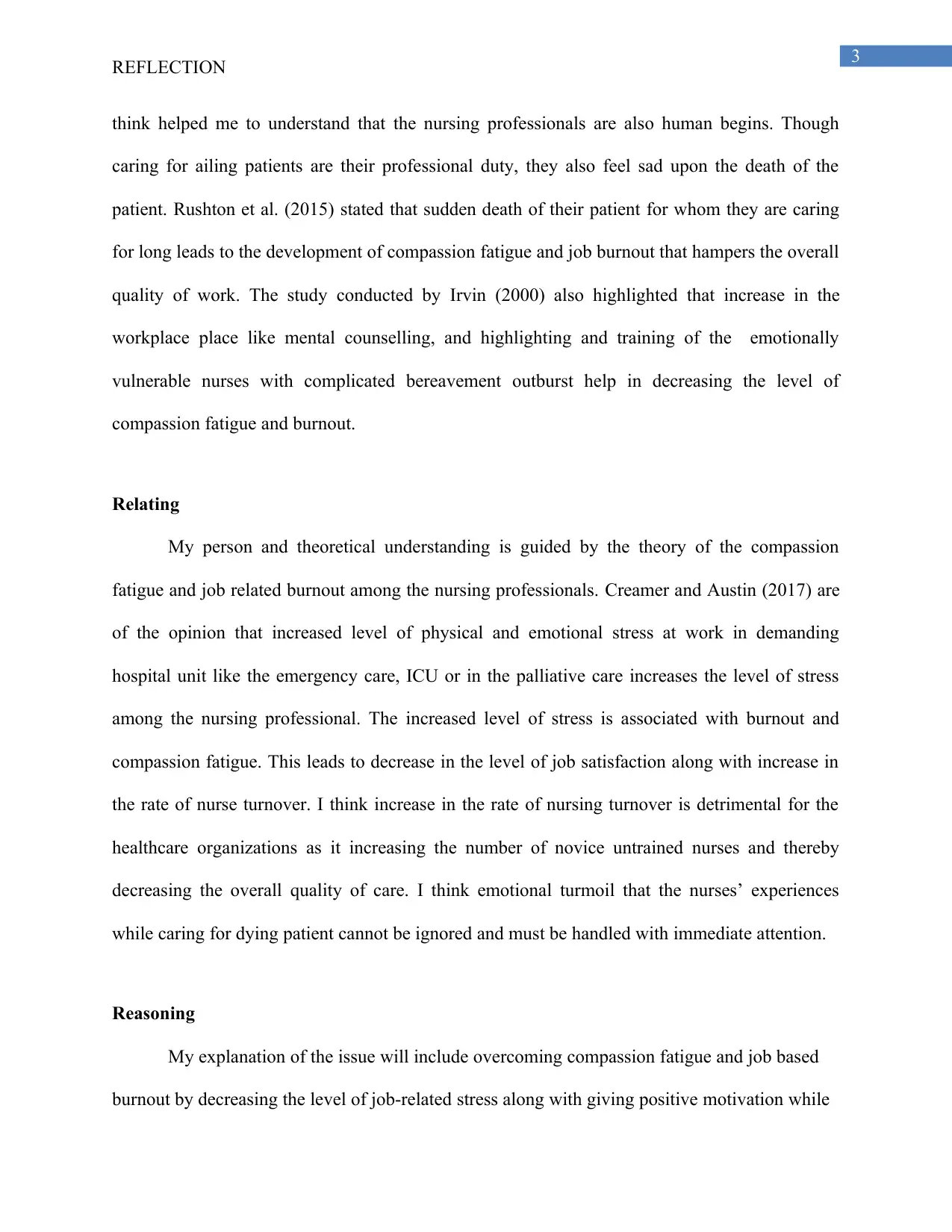
3
REFLECTION
think helped me to understand that the nursing professionals are also human begins. Though
caring for ailing patients are their professional duty, they also feel sad upon the death of the
patient. Rushton et al. (2015) stated that sudden death of their patient for whom they are caring
for long leads to the development of compassion fatigue and job burnout that hampers the overall
quality of work. The study conducted by Irvin (2000) also highlighted that increase in the
workplace place like mental counselling, and highlighting and training of the emotionally
vulnerable nurses with complicated bereavement outburst help in decreasing the level of
compassion fatigue and burnout.
Relating
My person and theoretical understanding is guided by the theory of the compassion
fatigue and job related burnout among the nursing professionals. Creamer and Austin (2017) are
of the opinion that increased level of physical and emotional stress at work in demanding
hospital unit like the emergency care, ICU or in the palliative care increases the level of stress
among the nursing professional. The increased level of stress is associated with burnout and
compassion fatigue. This leads to decrease in the level of job satisfaction along with increase in
the rate of nurse turnover. I think increase in the rate of nursing turnover is detrimental for the
healthcare organizations as it increasing the number of novice untrained nurses and thereby
decreasing the overall quality of care. I think emotional turmoil that the nurses’ experiences
while caring for dying patient cannot be ignored and must be handled with immediate attention.
Reasoning
My explanation of the issue will include overcoming compassion fatigue and job based
burnout by decreasing the level of job-related stress along with giving positive motivation while
REFLECTION
think helped me to understand that the nursing professionals are also human begins. Though
caring for ailing patients are their professional duty, they also feel sad upon the death of the
patient. Rushton et al. (2015) stated that sudden death of their patient for whom they are caring
for long leads to the development of compassion fatigue and job burnout that hampers the overall
quality of work. The study conducted by Irvin (2000) also highlighted that increase in the
workplace place like mental counselling, and highlighting and training of the emotionally
vulnerable nurses with complicated bereavement outburst help in decreasing the level of
compassion fatigue and burnout.
Relating
My person and theoretical understanding is guided by the theory of the compassion
fatigue and job related burnout among the nursing professionals. Creamer and Austin (2017) are
of the opinion that increased level of physical and emotional stress at work in demanding
hospital unit like the emergency care, ICU or in the palliative care increases the level of stress
among the nursing professional. The increased level of stress is associated with burnout and
compassion fatigue. This leads to decrease in the level of job satisfaction along with increase in
the rate of nurse turnover. I think increase in the rate of nursing turnover is detrimental for the
healthcare organizations as it increasing the number of novice untrained nurses and thereby
decreasing the overall quality of care. I think emotional turmoil that the nurses’ experiences
while caring for dying patient cannot be ignored and must be handled with immediate attention.
Reasoning
My explanation of the issue will include overcoming compassion fatigue and job based
burnout by decreasing the level of job-related stress along with giving positive motivation while
Paraphrase This Document
Need a fresh take? Get an instant paraphrase of this document with our AI Paraphraser
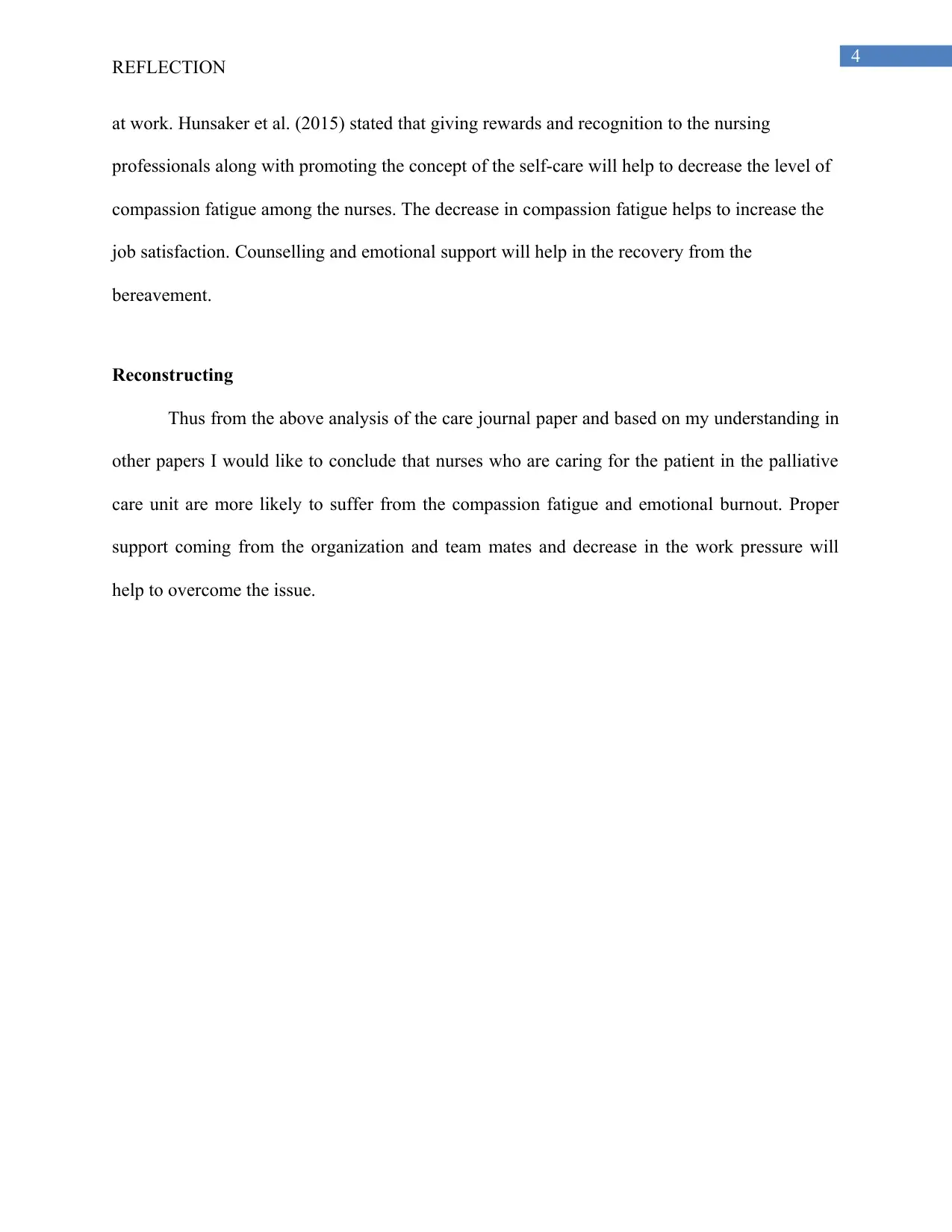
4
REFLECTION
at work. Hunsaker et al. (2015) stated that giving rewards and recognition to the nursing
professionals along with promoting the concept of the self-care will help to decrease the level of
compassion fatigue among the nurses. The decrease in compassion fatigue helps to increase the
job satisfaction. Counselling and emotional support will help in the recovery from the
bereavement.
Reconstructing
Thus from the above analysis of the care journal paper and based on my understanding in
other papers I would like to conclude that nurses who are caring for the patient in the palliative
care unit are more likely to suffer from the compassion fatigue and emotional burnout. Proper
support coming from the organization and team mates and decrease in the work pressure will
help to overcome the issue.
REFLECTION
at work. Hunsaker et al. (2015) stated that giving rewards and recognition to the nursing
professionals along with promoting the concept of the self-care will help to decrease the level of
compassion fatigue among the nurses. The decrease in compassion fatigue helps to increase the
job satisfaction. Counselling and emotional support will help in the recovery from the
bereavement.
Reconstructing
Thus from the above analysis of the care journal paper and based on my understanding in
other papers I would like to conclude that nurses who are caring for the patient in the palliative
care unit are more likely to suffer from the compassion fatigue and emotional burnout. Proper
support coming from the organization and team mates and decrease in the work pressure will
help to overcome the issue.
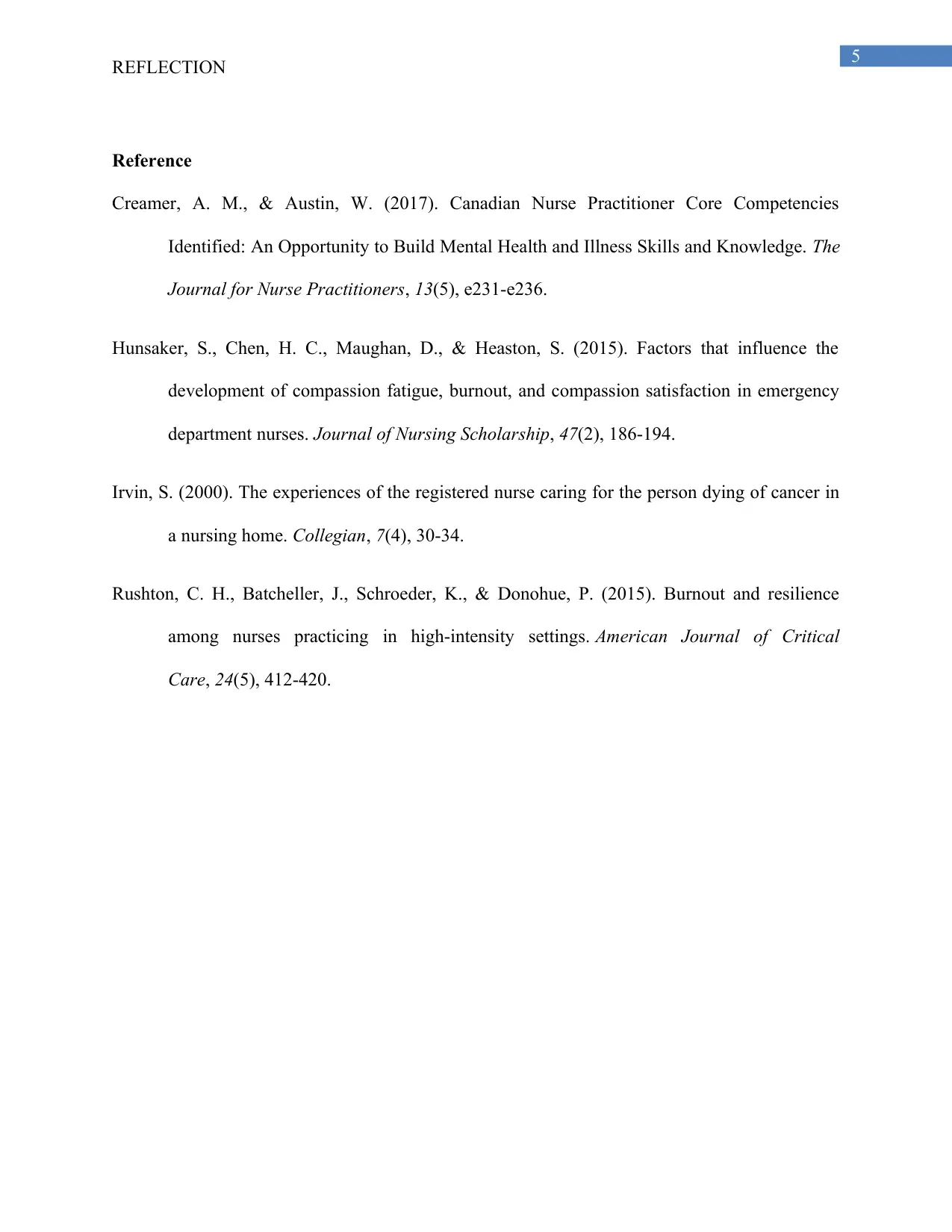
5
REFLECTION
Reference
Creamer, A. M., & Austin, W. (2017). Canadian Nurse Practitioner Core Competencies
Identified: An Opportunity to Build Mental Health and Illness Skills and Knowledge. The
Journal for Nurse Practitioners, 13(5), e231-e236.
Hunsaker, S., Chen, H. C., Maughan, D., & Heaston, S. (2015). Factors that influence the
development of compassion fatigue, burnout, and compassion satisfaction in emergency
department nurses. Journal of Nursing Scholarship, 47(2), 186-194.
Irvin, S. (2000). The experiences of the registered nurse caring for the person dying of cancer in
a nursing home. Collegian, 7(4), 30-34.
Rushton, C. H., Batcheller, J., Schroeder, K., & Donohue, P. (2015). Burnout and resilience
among nurses practicing in high-intensity settings. American Journal of Critical
Care, 24(5), 412-420.
REFLECTION
Reference
Creamer, A. M., & Austin, W. (2017). Canadian Nurse Practitioner Core Competencies
Identified: An Opportunity to Build Mental Health and Illness Skills and Knowledge. The
Journal for Nurse Practitioners, 13(5), e231-e236.
Hunsaker, S., Chen, H. C., Maughan, D., & Heaston, S. (2015). Factors that influence the
development of compassion fatigue, burnout, and compassion satisfaction in emergency
department nurses. Journal of Nursing Scholarship, 47(2), 186-194.
Irvin, S. (2000). The experiences of the registered nurse caring for the person dying of cancer in
a nursing home. Collegian, 7(4), 30-34.
Rushton, C. H., Batcheller, J., Schroeder, K., & Donohue, P. (2015). Burnout and resilience
among nurses practicing in high-intensity settings. American Journal of Critical
Care, 24(5), 412-420.
⊘ This is a preview!⊘
Do you want full access?
Subscribe today to unlock all pages.

Trusted by 1+ million students worldwide
1 out of 6
Related Documents
Your All-in-One AI-Powered Toolkit for Academic Success.
+13062052269
info@desklib.com
Available 24*7 on WhatsApp / Email
![[object Object]](/_next/static/media/star-bottom.7253800d.svg)
Unlock your academic potential
Copyright © 2020–2026 A2Z Services. All Rights Reserved. Developed and managed by ZUCOL.





